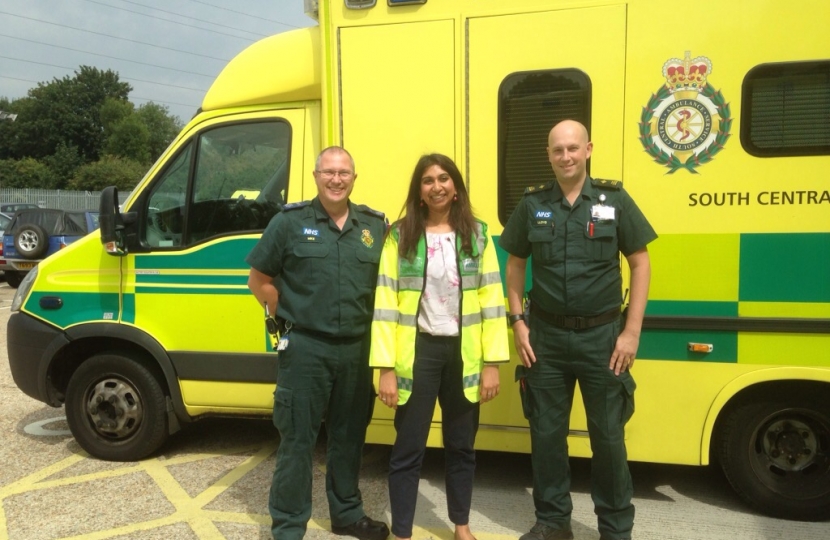
My morning shift started at 7.30am with Lloyd and Mike, Paramedics with South Central Ambulance Service. After the de-brief, I spent the morning with them, in the ambulance, responding to calls around the Fareham and Gosport area. These included an urgent response to a suspected heart attack, an elderly resident falling over whilst getting out of bed and a distress call from a mentally ill patient.
The visit was informative and inspiring as I saw first hand how dedicated, professional and responsive our Ambulance service is. On average, it took a maximum of 10 minutes to arrive at various call-outs and time was used efficiently in quickly identifying the problem, risk and whether the patient needed to go to hospital or not. Together with the Rapid Response Team, a very good service is being provided.
The ambulance service is a core component of the NHS in England; trusted to provide a swift and professional response to sudden illness at any time of the day or night. In recent years demand has risen steadily, exceeding that of A&E attendances and hospital admissions. Paramedics carry out a very important job and must be properly supported in carrying out this vital role. In January, the Secretary of State for Health announced that NHS England was to to pilot a change to the way ambulance services respond to 999 calls, based on clinical advice that this will improve the chances of survival for patients, especially those with the most serious conditions.
In light of the unprecedented increase in demand for ambulance services at the end of 2014, NHS England considered whether there were any changes which could be brought forward quickly in order to help ambulance services maintain, and perhaps even improve, clinical outcomes for patients.
In a letter from Professor Keith Willett, the National Director for Acute Care at NHS England, significant evidence was set out to suggest that giving call handlers extra assessment time to make the right decision for the patient could improve clinical outcomes and improve their chances of survival. At present, ambulance services are allowed only 60 seconds before the clock starts to decide what the right course of action is for that individual patient. This was sometimes leading to ambulances being dispatched unnecessarily, leaving fewer ambulances available for patients who really needed emergency assistance.
That is why, in the interests of patient safety, Ministers agreed that giving call handlers very limited extra assessment time would ensure that ambulances are better deployed to where they are most needed and would allow a faster response time for those patients who really need it. I am assured that the pilot will not be issued more widely unless there is clear clinical consensus that the proposed change will be beneficial to clinical outcomes and is safe for patients.
I am also pleased that the Health Secretary recognises the importance of recruiting more paramedics to meet the increased public need. I welcome the fact that there are currently 2,000 more paramedics across England, compared to 2010, and that Ministers plan to recruit a further 1,700 over the next few years in order to continue to improve the quality of care received by patients.
Some great work by our Ambulance Service. Thanks for the welcome!
